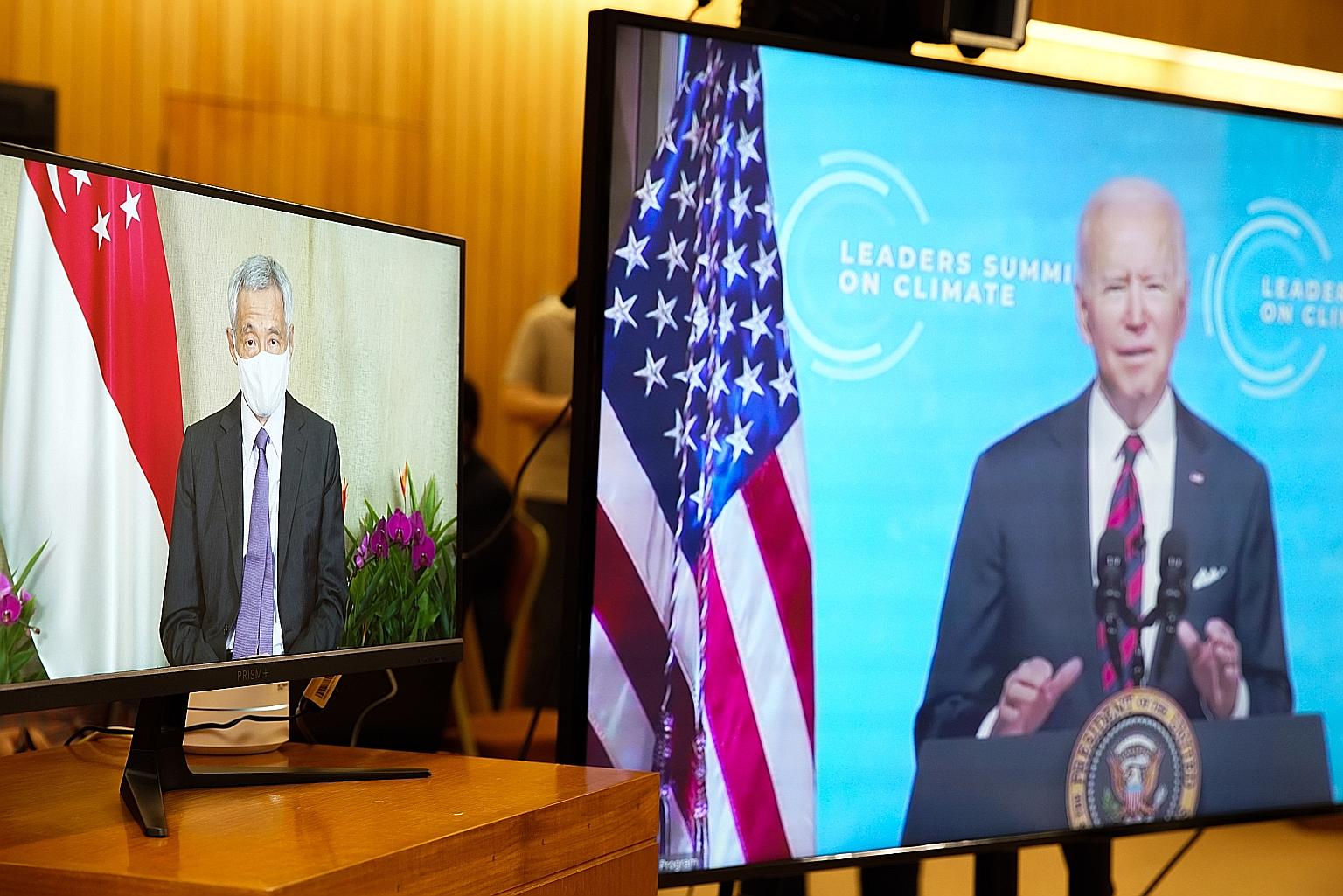World leaders vow deeper cuts to carbon emissions
US, Japan to halve emissions by 2030; China, Brazil to tackle coal use, illegal deforestation
Sign up now: Get ST's newsletters delivered to your inbox

Prime Minister Lee Hsien Loong was one of the world leaders attending the Leaders Summit on Climate yesterday that was hosted by US President Joe Biden.
PHOTO: MINISTRY OF COMMUNICATIONS AND INFORMATION
World leaders pledged tougher new carbon emission reduction targets at a virtual climate summit yesterday, stepping up the fight to limit temperature rise to 1.5 deg C above pre-industrial levels, instead of the 3 deg C the planet is currently headed towards.
The United States vowed to halve the planet-warming greenhouse gases it emits by 2030, a target largely matched by Japan. Meanwhile, China pledged to phase down coal consumption, Brazil to end illegal deforestation by 2030, and South Korea to stop state-backed financing of overseas coal-fired plants.
"The signs are unmistakable. The science is undeniable. The cost of inaction keeps mounting. The United States isn't waiting," said US President Joe Biden at the start of the two-day summit, as he called on other big polluters to make deeper cuts in their own carbon emissions.
Stressing that time is running out, he said: "This is the decade (when) we must make decisions that will avoid the worst consequences of the climate crisis."
With the summit, the Biden administration is seeking to galvanise the rest of the world into raising their climate ambitions and to re-establish American leadership on the issue, restoring Washington's credibility in the global fight against climate change after years of neglect under the Trump presidency.
The summit was attended by 40 leaders - including Singapore's Prime Minister Lee Hsien Loong - of countries ranging from the world's biggest polluters to those hit hard by climate change, corporate executives and mayors.
The updated US target of cutting carbon emissions by 50 per cent to 52 per cent from 2005 levels by 2030 is higher than the 26 per cent to 28 per cent pledged by the Obama administration in 2014, but the announcement was not accompanied by specific details on how it will be achieved.
Chinese President Xi Jinping said China, the world's largest producer and consumer of coal, will strictly control coal-fired power generation projects and limit the increase in coal consumption from this year until 2025, before phasing it down from 2025 to 2030.
China will strive to peak carbon dioxide emissions before 2030 and achieve neutrality before 2060, said Mr Xi, calling it "a much shorter time span" than what many developed countries took, which will require "extraordinarily hard effort from China".
The tensions typically on display between the US and other countries like China, Russia and Brazil were largely put aside yesterday, as leaders committed to uniting in their quests to achieve carbon neutrality by the mid-century.
"Global decarbonisation... cannot be achieved by the efforts of one country alone. It is a challenge that requires a whole international community to be united," said Japan's Prime Minister Yoshihide Suga, who announced earlier that his country aims to cut its emissions by 46 per cent by 2030, based on 2013 levels.
Canada, meanwhile, announced it was raising its target to reduce emissions by 40 per cent to 45 per cent from 2005 levels by 2030, up from its previous pledge of 30 per cent.
This global fight for carbon neutrality "should certainly unite the efforts of the international community as a whole", said Russian President Vladimir Putin.
US Secretary of State Antony Blinken said: "There are many issues on which we don't all see eye to eye. This isn't one of them."
The Biden administration also strove to make the case, as much to its domestic audience as to its international interlocutors, that climate action can go hand in hand with creating jobs and generating other economic benefits.
And in a demonstration of renewed American leadership, Mr Blinken said the US will mobilise resources, institutional knowledge, and technical expertise from the government, the private sector, civil society and research universities to help other countries meet their climate targets.
The Climate Action Network, which comprises over 1,500 civil society organisations around the world, said the summit fell short in announcing new financial pledges needed by developing nations to meet their climate and development goals. The climate targets announced yesterday also fall short of what is needed to avert catastrophe and are "simply not aligned with the science or based on their fair share", the network added in a statement.


